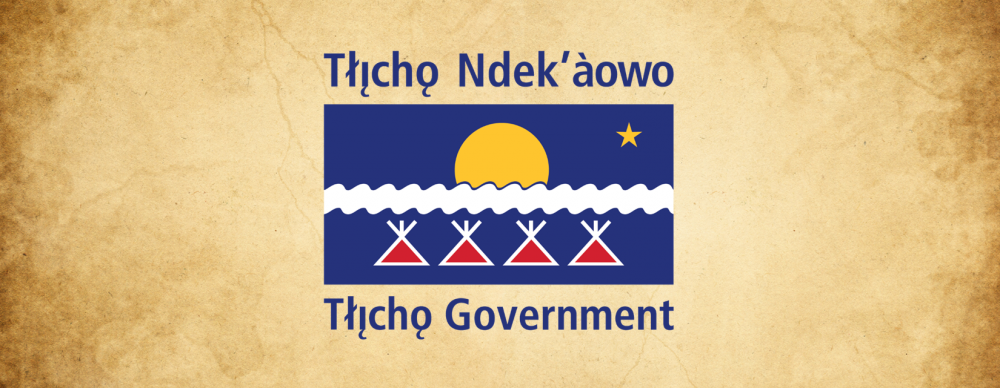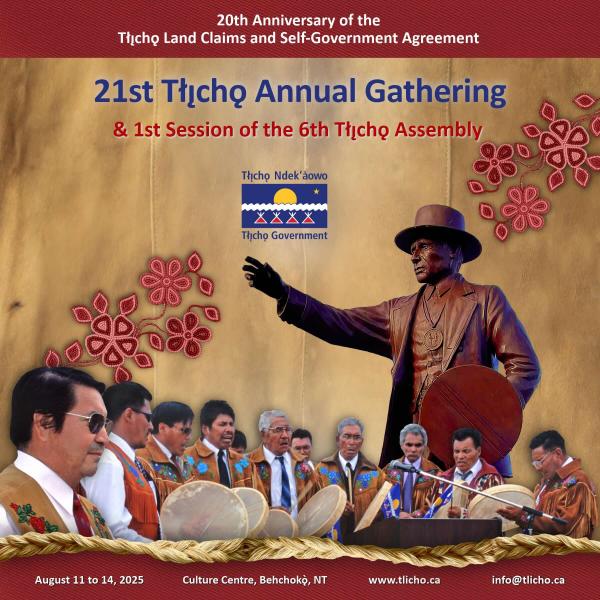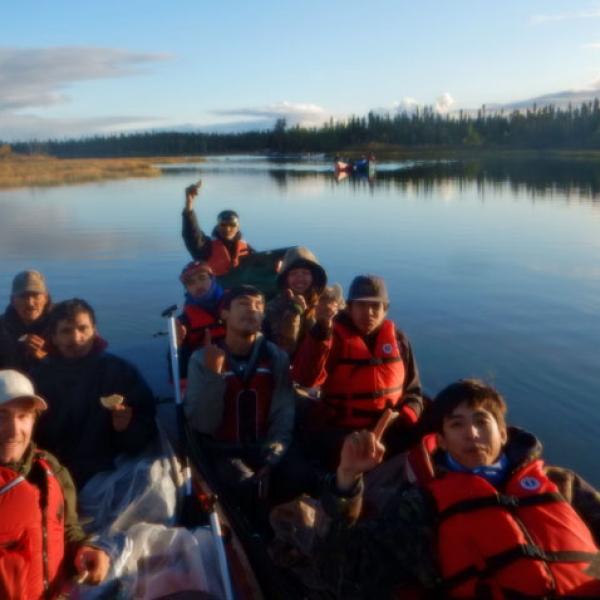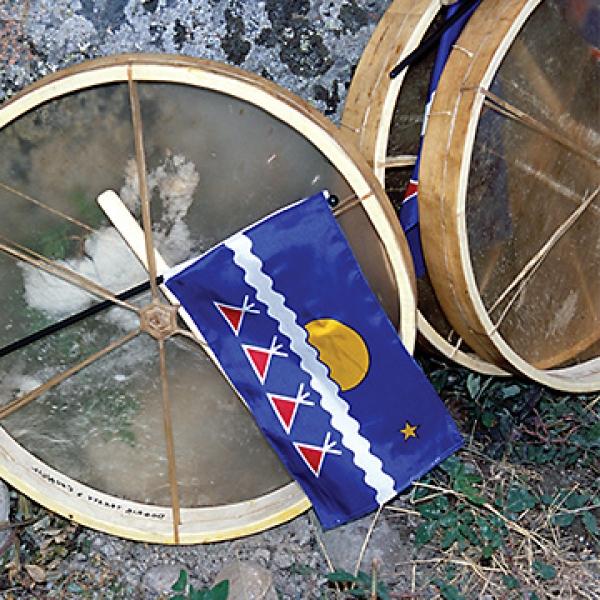Groundbreaking Agreement Will Invest in Indigenous Leadership for Sustaining Lands, Cultures, and Economic Development across the NWT
November 14, 2024, Behchokǫ̀, NWT: Representatives of 22 Indigenous Governments, the Government of Canada, the Government of the Northwest Territories, and private donors signed an historic agreement today that will fund Indigenous-led conservation, stewardship, and economic development across the Northwest Territories.
Known as NWT: Our Land for the Future, it will create transformative benefits on the ground for lands and waters, climate resilience, cultural revitalization, and local economies. It will be one of the largest Indigenous-led land conservation initiatives in the world.
Today’s announcement will enable $375 million to support the initiative, including $300 million from the Government of Canada and $75 million from private donors. This would be the largest single investment in Indigenous-led conservation and stewardship in the NWT. Funds are intended to start flowing by mid-2025, and these investments could support hundreds of jobs per year, including seasonal, part-time, and full-time positions, over the first 10 years.
The agreement announced today reflects an unprecedented level of collaboration. It includes more Indigenous Governments than similar conservation-based initiatives around the world. These Indigenous Governments led a two-year process to find common ground among diverse partners across regions, including public governments, and private donors. While the NWT has a strong tradition of building consensus, this agreement demonstrates a new breadth of cooperative action.
What drew partners together was a shared vision for supporting Indigenous leadership in caring for the land and water. The agreement signed today will help turn that vision into a reality by investing in a range of conservation and stewardship activities.
The funds can be used to establish new protected and conserved areas identified by Indigenous Governments—and following all existing decision-making processes. They could support Indigenous Guardians and other stewardship programs. They could also invest in other conservation-related initiatives, such as ecotourism and traditional economic activities, as well as climate research and help communities become more resilient in the face of increasing wildfires, low water levels, and other impacts. And they could sustain on-the-land language and culture programs that strengthen community health and well-being. All these activities will be carried out in ways that are consistent with Indigenous self-determination.
Taken together, NWT: Our Land for the Future will help tackle the dual challenges of loss of biodiversity and climate change. It will also help Canada achieve its commitment to protect 30 per cent of lands and inland waters by 2030.
Caring for lands, waters, and wildlife on this scale will help diversify the region’s economy. In addition to supporting hundreds of jobs, the initiative will support partners to follow existing land-use decision-making processes that will provide greater certainty around where conservation and development will be prioritized. Having Guardians on the ground, serving as the eyes and ears for Indigenous Governments, will also strengthen decision making, build trust between partners, and support a balance between conservation and economic development.
The initiative is designed around the conservation financing model known as Project Finance for Permanence. PFPs lead to comprehensive funding agreements between partners including governments at multiple levels and private philanthropies that are designed to sustain healthy lands and local economies. Within the Northwest Territories, this means building on a strong foundation of collaboration among Indigenous and public governments.
Representatives of the initiative’s partners shared the following quotes:
“The signing of this landmark agreement marks a historic milestone in nature protection in the north and is a testament to what can be achieved through collaboration and a shared commitment to safeguarding nature, and building a conservation economy. Indigenous-led stewardship is central to achieving Canada’s ambitious goal of protecting 30 per cent of lands and waters by 2030, and the Northwest Territories—rich in environmental and cultural values—plays a leadership role in these efforts. With our support to Indigenous leadership in conservation, we are ensuring the protection of these lands, as well as creating cultural and economic opportunities for our children, grandchildren, and all future generations.” —The Honourable Steven Guilbeault, Minister of Environment and Climate Change Canada
“Indigenous Peoples have been stewards of land for millennia, and their leadership is essential to protecting and preserving the environment. This historic agreement, one of the largest Indigenous-led land conservation initiatives in the world moves us closer to our goal of conserving 30 per cent of lands and waters by 2030. Today is another step forward on the path towards reconciliation, and a testament of what can be done when we work together in true partnership.” —The Honourable Gary Anandasangaree, Minister of Crown-Indigenous Relations
“Today’s agreement is a milestone for the Northwest Territories, setting a new standard for partnership in conservation and stewardship. This Indigenous-led initiative brings together communities, governments, and donors with a shared vision to protect and care for NWT land and waters while creating meaningful economic opportunities. Through this agreement, we are supporting Indigenous leadership, honouring traditional knowledge, and ensuring a healthy, sustainable future for the territory.” —The Honourable Jay Macdonald, Minister of Environment and Climate Change, Government of the Northwest Territories
“On behalf of the Tłı̨chǫ Government Chief’s Executive Council, we are proud to be hosting the celebration of this new Indigenous-led land stewardship fund in the Tłı̨chǫ community of Behchokǫ̀. As Tłı̨chǫ, we will continue to approach conservation and development in a way that balances economic benefits with cultural and environmental values, to support Tłı̨chǫ self-sufficiency and honor our responsibility to serve for all time as custodians of our lands, waters, and resources.” —Grand Chief Jackson Lafferty, Tłı̨chǫ Government
“The PFP will enable Indigenous Governments to create and protect sacred paradises our forefathers have long cherished since the beginning of time.” —Grand Chief Herb Norwegian, Dehcho First Nations
“Our cultures and our prosperity are rooted in the land. This initiative will support Délı̨nę Got'ı̨nę Government to honour our stewardship responsibilities to the lands and waters that have sustained us since time immemorial. Our leadership will ensure a balance to conservation with a range of economic opportunities. And it will help our community to honour the vision of our Elders to protect Sahtú K’aowe (Great Bear Lake watershed), a sacred source of clean water for today and for the future.” —Ɂek’wahtı̨dǝ́ Danny Gaudet, Délįnę Got’įnę Government
“The Lutsel K’e Dene First Nation is proud to have worked in unity with the Indigenous governments of the NWT to secure this critical investment in the care of our lands and the promotion of our ways of life. These investments will support stewardship jobs and cultural programming in our Thaidene Nene protected area and will help us continue on our path to creating a sustainable economy in Lutsel K’e.” —Chief James Marlowe, Łutsël K’é Dene First Nation
“The Northwest Territory Métis Nation is proud to have collaborated with Indigenous Governments throughout the NWT to achieve this important milestone. The NWTMN is always balancing environmental stewardship and economic development for our members. In this area, we have prioritized environmental stewardship to ensure our way of life continues, while promoting our participation in the evolving conservation economy. The protection of lands in the NWT with our involvement through the Our Land for the Future initiative will ensure they continue to be protected and managed for present and future generations of Indigenous People and all Canadians.” —President Garry Bailey, Northwest Territory Métis Nation
“The impacts of climate change affect all people but are particularly harmful to Indigenous peoples who rely on the natural environment for sustenance, and cultural and spiritual well-being. Access to long-term, reliable funding will help to ensure that the Indigenous peoples of the Northwest Territories are a leading voice in the fight to preserve our lands. This is an unprecedented opportunity for private donors, the federal and territorial governments, and Indigenous governments to partner together to advance our shared environmental and economic goals. I am proud to sign the Our Land for the Future Agreement on behalf of the North Slave Métis Alliance.” —President Marc Whitford, North Slave Métis Alliance
“Indigenous Peoples lead the world in stewarding lands and waters for future generations. This agreement secures the commitments and resources necessary for Indigenous Governments throughout the Northwest Territories to achieve the ambitions they have set for themselves. Pew has been proud to partner with Indigenous communities on conservation for decades, and we are honored to play a role—with Indigenous leaders, and alongside the many Canadian and international donors and the government of Canada who have committed long-term funding for their efforts—in sustaining progress of this scale in such a special place.” —Tom Dillon, Senior Vice President for Environment and Crosscutting Initiatives at The Pew Charitable Trusts
Signatories to the final agreement for NWT: Our Land for the Future include:
- Gwich'in Tribal Council
- North Slave Métis Alliance
- Tłįchǫ Government
- Délı̨nę Got'ı̨nę Government
- Fort Good Hope Dene Band
- Tulita Dene Band
- Tłegǫ́hłı̨ Got'įnę Government Incorporated
- Tulit'a Land and Finance Corporation
- Yellowknives Dene First Nation, Dettah
- Yellowknives Dene First Nation, Ndilo
- Smith's Landing First Nation
- Łútsël K'é Dene First Nation
- Deninu Kue First Nation
- Northwest Territory Métis Nation
- Fort Resolution Métis Government
- Dehcho First Nations
- Tthets’éhk’edélî First Nation
- Ka'a'gee Tu First Nation
- Nahʔą Dehé Dene Band
- Pehdzeh Ki First Nation
- Sambaa K'e First Nation
- Acho Dene Koe First Nation
- K’atłodeeche First Nation
- Government of Canada
- Government of the Northwest Territories
- The Pew Charitable Trusts
- Waltons Trust
- Metcalf Foundation
For more information, please contact:
Kelley Ryder
Communications Manager
Tłı̨chǫ Government
Phone: 867-444-9963
Email: [email protected]
Web: www.tlicho.ca






